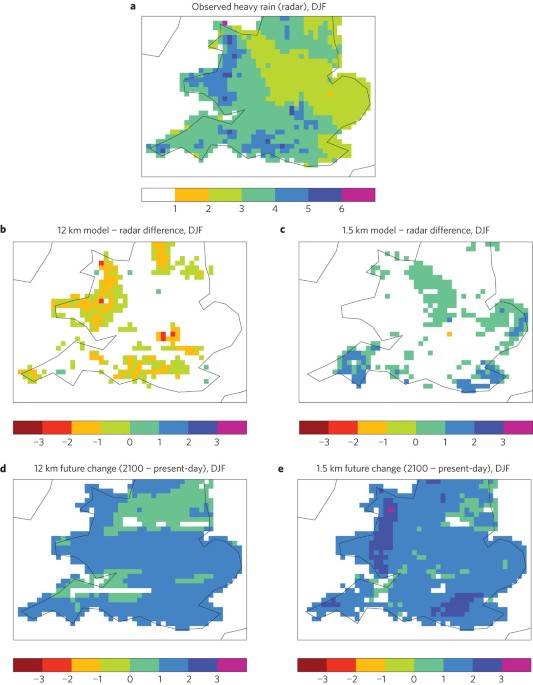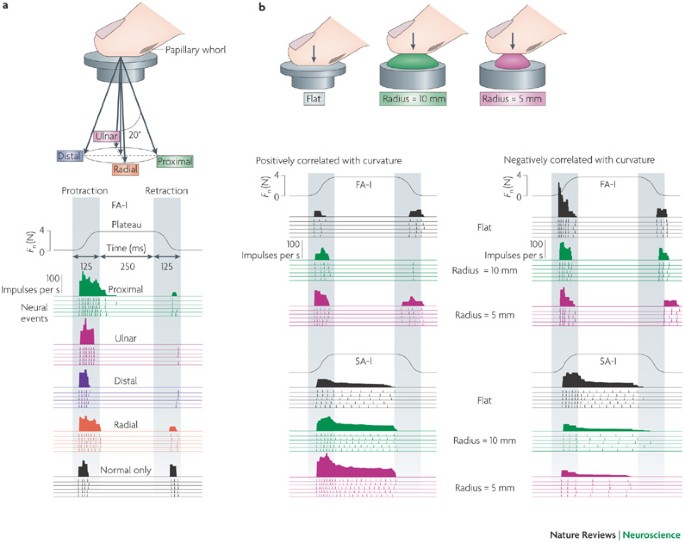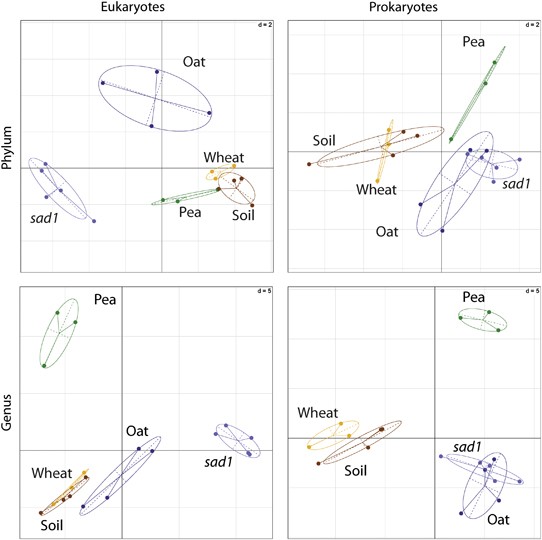
- Select a language for the TTS:
- UK English Female
- UK English Male
- US English Female
- US English Male
- Australian Female
- Australian Male
- Language selected: (auto detect) - EN
Play all audios:
ABSTRACT The intensification of precipitation extremes with climate change1 is of key importance to society as a result of the large impact through flooding. Observations show that heavy
rainfall is increasing on daily timescales in many regions2, but how changes will manifest themselves on sub-daily timescales remains highly uncertain. Here we perform the first climate
change experiments with a very high resolution (1.5 km grid spacing) model more typically used for weather forecasting, in this instance for a region of the UK. The model simulates realistic
hourly rainfall characteristics, including extremes3,4, unlike coarser resolution climate models5,6, giving us confidence in its ability to project future changes at this timescale. We find
the 1.5 km model shows increases in hourly rainfall intensities in winter, consistent with projections from a coarser 12 km resolution model and previous studies at the daily timescale7.
However, the 1.5 km model also shows a future intensification of short-duration rain in summer, with significantly more events exceeding the high thresholds indicative of serious flash
flooding. We conclude that accurate representation of the local storm dynamics is an essential requirement for predicting changes to convective extremes; when included we find for the model
here that summer downpours intensify with warming. Access through your institution Buy or subscribe This is a preview of subscription content, access via your institution ACCESS OPTIONS
Access through your institution Subscribe to this journal Receive 12 print issues and online access $209.00 per year only $17.42 per issue Learn more Buy this article * Purchase on
SpringerLink * Instant access to full article PDF Buy now Prices may be subject to local taxes which are calculated during checkout ADDITIONAL ACCESS OPTIONS: * Log in * Learn about
institutional subscriptions * Read our FAQs * Contact customer support SIMILAR CONTENT BEING VIEWED BY OTHERS INCREASES IN EXTREME PRECIPITATION OVER THE NORTHEAST UNITED STATES USING
HIGH-RESOLUTION CLIMATE MODEL SIMULATIONS Article Open access 22 March 2023 VARIABILITY CONCEALS EMERGING TREND IN 100YR PROJECTIONS OF UK LOCAL HOURLY RAINFALL EXTREMES Article Open access
07 March 2023 LARGE-SCALE DYNAMICS MODERATE IMPACT-RELEVANT CHANGES TO ORGANISED CONVECTIVE STORMS Article Open access 05 January 2023 REFERENCES * Trenberth, K. E., Dai, A., Rasmussen, R.
M. & Parsons, D. B. The changing character of precipitation. _Bull. Am. Meteorol. Soc._ 84, 1205–1217 (2003). Article Google Scholar * Min, S-K., Zhang, X., Zwiers, F. W. & Hegerl,
G. C. Human contribution to more-intense precipitation extremes. _Nature_ 470, 376–379 (2011). Article Google Scholar * Kendon, E. J., Roberts, N. M., Senior, C. A. & Roberts, M. J.
Realism of rainfall in a very high resolution regional climate model. _J. Clim._ 25, 5791–5806 (2012). Article Google Scholar * Chan, S. C. et al. The value of high-resolution Met Office
regional climate models in the simulation of multi-hourly precipitation extremes. _J. Clim._ http://dx.doi.org/10.1175/JCLI-D-13-00723.1 (in the press). * Hanel, M. & Buishand, T. A. On
the value of hourly precipitation extremes in regional climate model simulations. _J. Hydrol._ 393, 265–273 (2010). Article Google Scholar * Gregersen, I. B. et al. Assessing future
climatic changes of rainfall extremes at small spatio-temporal scales. _Climatic Change_ 118, 783–797 (2013). Article Google Scholar * Fowler, H. J. & Ekström, M. Multi-model ensemble
estimates of climate change impacts on UK seasonal precipitation extremes. _Int. J. Climatol._ 29, 385–416 (2009). Article Google Scholar * Lenderink, G. & van Meijgaard, E. Increase
in hourly precipitation extremes beyond expectations from temperature changes. _Nature Geosci._ 1, 511–514 (2008). Article CAS Google Scholar * Burt, S. Cloudburst upon Hendraburnick
Down: The Boscastle storm of 16 August 2004. _Weather_ 60, 219–227 (2005). Article Google Scholar * Berg, P., Moseley, C. & Haerter, J. O. Strong increase in convective precipitation
in response to higher temperatures. _Nature Geosci._ 6, 181–185 (2013). Article CAS Google Scholar * Brockhaus, P., Lüthi, D. & Schär, C. Aspects of the diurnal cycle in a regional
climate model. _Meteorol. Z._ 17, 433–443 (2008). Article Google Scholar * Hohenegger, C., Brockhaus, P. & Schär, C. Towards climate simulations at cloud-resolving scales. _Meteorol.
Z._ 17, 383–394 (2008). Article Google Scholar * Lean, H. W. et al. Characteristics of high-resolution versions of the Met Office Unified Model for forecasting convection over the United
Kingdom. _Mon. Weath. Rev._ 136, 3408–3424 (2008). Article Google Scholar * Langhans, W., Schmidli, J., Fuhrer, O., Bieri, S. & Schär, C. Long-term simulations of thermally driven
flows and orographic convection at convection-parameterizing and cloud-resolving resolutions. _J. Appl. Meteorol. Clim._ 52, 1490–1510 (2013). Article Google Scholar * Prein, A. F. et al.
Added value of convection permitting seasonal simulations. _Clim. Dynam._ 41, 2655–2677 (2013). Article Google Scholar * Mahoney, K., Alexander, M., Scott, J. D. & Barsugli, J.
High-resolution downscaled simulations of warm-season extreme precipitation events in the Colorado Front Range under past and future climates. _J. Clim._ 26, 8671–8689 (2013). Article
Google Scholar * Attema, J. J., Loriaux, J. M. & Lenderink, G. Extreme precipitation response to climate perturbations in an atmospheric mesoscale model. _Environ. Res. Lett._ 9, 014003
(2014). Article Google Scholar * Wakazuki, Y., Nakamura, M., Kanada, S. & Muroi, C. Climatological reproducibility evaluation and future climate projection of extreme precipitation
events in the Baiu Season using a high-resolution non-hydrostatic RCM in comparison with an AGCM. _J. Meteorol. Soc. Jpn_ 86, 951–967 (2008). Article Google Scholar * Knote, C., Heinemann,
G. & Rockel, B. Changes in weather extremes: Assessment of return values using high resolution climate simulations at convection-resolving scale. _Meteorol. Z._ 19, 11–23 (2010).
Article Google Scholar * Trapp, R. J., Robinson, E. D., Baldwin, M. E., Diffenbaugh, N. S. & Schwedler, B. R. J. Regional climate of hazardous convective weather through
high-resolution dynamical downscaling. _Clim. Dynam._ 37, 677–688 (2011). Article Google Scholar * Hohenegger, C., Brockhaus, P., Bretherton, C. S. & Schär, C. The soil
moisture-precipitation feedback in simulations with explicit and parameterized convection. _J. Clim._ 22, 5003–5020 (2009). Article Google Scholar * Pan, L-L. et al. Influences of climate
change on California and Nevada regions revealed by a high-resolution dynamical downscaling study. _Clim. Dynam._ 37, 2005–2020 (2011). Article Google Scholar * Golding, B. W. Nimrod: A
system for generating automated very short range forecasts. _Meteorol. Appl._ 5, 1–16 (1998). Article Google Scholar * Harrison, D. L., Driscoll, S. J. & Kitchen, M. Improving
precipitation estimates from weather radar using quality control and correction techniques. _Meteorol. Appl._ 7, 135–144 (2000). Article Google Scholar * Walters, D. N. et al. The Met
Office Unified Model global atmosphere 3.0/3.1 and JULES global land 3.0/3.1 configurations. _Geosci. Model Dev._ 4, 919–941 (2011). Article Google Scholar * Wilkinson, J. M. et al.
Improved microphysical parametrization of drizzle and fog for operational forecasting using the Met Office Unifed Model. _Q. J. R. Meteorol. Soc._ 139, 488–500 (2013). Article Google
Scholar * Li, D. & Shine, K. P. _A 4-dimensional Ozone Climatology for UGAMP Models._ Technical Report 35 (UGAMP 1995) * Collins, W. J. et al. Development and evaluation of an
Earth-System model—HadGEM2. _Geosci. Model Dev._ 4, 1051–1075 (2011). Article Google Scholar * Bower, K. N. & Choularton, T. W. A parametrisation of the effective radius of ice free
clouds for use in global climate models. _Atmos. Res._ 27, 305–339 (1992). Article Google Scholar * Best, M. J. et al. The Joint UK Land Environment Simulator (JULES), model
description—Part 1: Energy and water fluxes. _Geosci. Model Dev._ 4, 595–640 (2011). Article Google Scholar Download references ACKNOWLEDGEMENTS Thanks to colleagues across the UK Met
Office for their help in setting up the 1.5 km and 12 km model experiments, especially C. Wang, J. Bornemann and W. Moufouma-Okia. Also thanks to J. Wilkinson, P. Field, C. Pilling and H.
Lean for useful discussions. We gratefully acknowledge funding from the Joint Department of Energy and Climate Change (DECC) and Department for Environment Food and Rural Affairs (Defra) Met
Office Hadley Centre Climate Programme (GA01101). This work also forms part of a joint UK Met Office and Natural Environment Research Council (UKMO-NERC) funded project on Convective
Extremes (CONVEX, NE/1006680/1). AUTHOR INFORMATION AUTHORS AND AFFILIATIONS * Met Office Hadley Centre, FitzRoy Road, Exeter, EX1 3PB, UK Elizabeth J. Kendon, Malcolm J. Roberts &
Catherine A. Senior * MetOffice@Reading, Reading, RG6 6BB, UK Nigel M. Roberts * School of Civil Engineering and Geosciences, Newcastle University, Newcastle, NE1 7RU, UK Hayley J. Fowler
& Steven C. Chan Authors * Elizabeth J. Kendon View author publications You can also search for this author inPubMed Google Scholar * Nigel M. Roberts View author publications You can
also search for this author inPubMed Google Scholar * Hayley J. Fowler View author publications You can also search for this author inPubMed Google Scholar * Malcolm J. Roberts View author
publications You can also search for this author inPubMed Google Scholar * Steven C. Chan View author publications You can also search for this author inPubMed Google Scholar * Catherine A.
Senior View author publications You can also search for this author inPubMed Google Scholar CONTRIBUTIONS E.J.K. carried out the 1.5 km and 12 km model experiments and wrote the paper.
N.M.R. analysed the performance of the 1.5 km model from weather forecasts, produced Supplementary Fig. 1, and along with H.J.F. extensively contributed to the manuscript. M.J.R. ran the 60
km global model experiments. All authors discussed the results and commented on the manuscript. CORRESPONDING AUTHOR Correspondence to Elizabeth J. Kendon. ETHICS DECLARATIONS COMPETING
INTERESTS The authors declare no competing financial interests. SUPPLEMENTARY INFORMATION SUPPLEMENTARY INFORMATION (PDF 417 KB) RIGHTS AND PERMISSIONS Reprints and permissions ABOUT THIS
ARTICLE CITE THIS ARTICLE Kendon, E., Roberts, N., Fowler, H. _et al._ Heavier summer downpours with climate change revealed by weather forecast resolution model. _Nature Clim Change_ 4,
570–576 (2014). https://doi.org/10.1038/nclimate2258 Download citation * Received: 07 February 2014 * Accepted: 06 May 2014 * Published: 01 June 2014 * Issue Date: July 2014 * DOI:
https://doi.org/10.1038/nclimate2258 SHARE THIS ARTICLE Anyone you share the following link with will be able to read this content: Get shareable link Sorry, a shareable link is not
currently available for this article. Copy to clipboard Provided by the Springer Nature SharedIt content-sharing initiative







